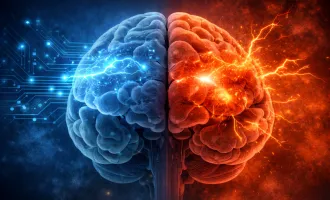T Cells Make Me Anxious
Prioritization is an important skill in life, ensuring that the most important tasks are completed first -- turns out the body prioritizes immune response over emotional health.
T cells are the primary soldiers of the immune system, marching around the body to target and kill infected cells or helping other immune cells better support the attack.
We’ve known for some time that when T cells get activated, the change their metabolic profile to support their ability to send messages and divide. These activities take a lot of energy and the synthesis of new proteins.
For T cells to become fully activated in the first place, they require both the presence of activation signals and the absence of inhibitory signals. PD-1 is one important inhibitory receptor on T cells.
Under Dr. Sidonia Fagarasan (shout out to female discovery), investigators at the Riken institute in Japan conducted a study that asked how a specific T cell receptor, PD-1, affects metabolic state of the whole organism.
To do this the investigators studied mice with a DNA mutation in the PD-1 gene causing loss of functional PD-1 in the whole mouse, including T cells.
As the mice aged, they accumulated more activated T cells specifically in immune organs called lymph nodes. These are the major stations along the immune railroads of our bodies. It is here that different immune cell types interact to mount an effective response against pathogens.
In line with previous studies, activated T cells used more energy and resources than naïve, inactivated cells.
Amino acids are a main resource that contribute to energy production and serve as the building blocks for every single protein.
Loss of PD-1 caused T cells to consume significantly more amino acids circulating in the blood, diminishing the amount of amino acids available to other organs and cell types. Specifically, tryptophan and tyrosine were consistently lower in the blood of mice lacking PD-1 and continued to diminish with age.
Tryptophan and tyrosine are required for the production of the neurotransmitters dopamine and serotonin, which are messengers that allow the neurons in your brain to communicate.
Dopamine is famous for its role in reward and motivation behaviors, including learning and fear responses. It’s the ooey gooey feeling of love or pleasure after eating a piece of dark chocolate.
Serotonin also regulates mood and social behaviors, including anxiety, aggression, and fear. Fun fact, many hallucinogenic drugs affect your mental state by mimicking serotonin.
Lacking either of these messengers can have profoundly negative effects on your mental state.
The investigators found significantly reduced levels of both dopamine and serotonin in the brains of mice lacking PD-1, corresponding with the lower levels of tryptophan and tyrosine they observed.
Not only was production of these neurotransmitters affected, but there was also evidence of accelerated degradation of these proteins.
Based on these findings, the authors next investigated whether changes in neurotransmitter levels affect behavior.
There are several ways to test anxiety and fear in mice.
One experiment is called the open-arm test, where mice are placed on a platform shaped like an X; two arms are open to the room, and walls surround the other two arms. More anxious mice spend less time exploring the open arms, and more time hiding in the closed arms.
Fear can be tested using standard Pavlovian fear conditioning. Mice are exposed to a cue, such as a specific sound, and then an adverse event, like an electric shock. Scared mice freeze in place, which can be measured in the presence or absence of the learned cue.
From these experiments, the authors found that mice without PD-1 demonstrated increased anxiety and fear responses, in addition to being generally less motile.
Finally, the investigators asked if they could correct the metabolic and behavioral changes by altering diet. They determined that supplementing the diet with tryptophan alone was sufficient to rescue serotonin levels in the brain and reduce anxiety behaviors.
The findings of this study could be replicated with natural immune activation by infection, or by PD-1 inhibitors.
This study comes at a very relevant time because of recent popularity in PD-1 inhibitors as a cancer therapeutic. Blocking PD-1 allows for increased T cell activation, which, in this setting, is directed at killing the tumor.
These inhibitors are being used or have been tried with most cancers.
While no human data was provided in this study, it necessitates careful study of patient behavior on or off drugs affecting immune activity.
Behavior may be used as an indicator of effective patient response. Or conversely, diet alterations could be added to immunotherapy to prevent unnecessary fear and anxiety.
Careful study on the dynamics of metabolism, brain neurotransmitters, and immune activity will be important.
How much T cell activity is required to affect mental behavior, if it happens at all in humans?
Does the flu make us more anxious or fearful? What about patients with autoimmune diseases that manifest in hyperactive T cells?
Scientific study never ends.
For the full study, visit https://www.nature.com/articles/ni.3867




